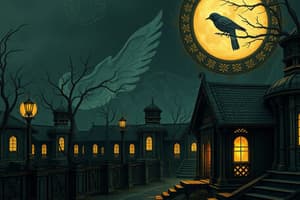Podcast
Questions and Answers
Identify the speaker and significance of the quote: They called him ________ _____ ___________, as if his entire life he had never had a surname.
Identify the speaker and significance of the quote: They called him ________ _____ ___________, as if his entire life he had never had a surname.
Moishe the Beadle
What is the little town in Transylvania where Elie Wiesel spent his childhood?
What is the little town in Transylvania where Elie Wiesel spent his childhood?
Sighet
In the statement 'I was almost thirteen and deeply observant', what does Elie Wiesel indicate about his character?
In the statement 'I was almost thirteen and deeply observant', what does Elie Wiesel indicate about his character?
Devout to his religion
Who is described as wanting to drive the idea of studying Kabbalah from Elie Wiesel's mind?
Who is described as wanting to drive the idea of studying Kabbalah from Elie Wiesel's mind?
Who asked Elie Wiesel, 'Why do you cry when you pray?'
Who asked Elie Wiesel, 'Why do you cry when you pray?'
What phrase does Elie Wiesel associate with the ability of question to possess power?
What phrase does Elie Wiesel associate with the ability of question to possess power?
And then one day all foreign Jews were expelled from Sighet. And ___________ was a foreigner.
And then one day all foreign Jews were expelled from Sighet. And ___________ was a foreigner.
How did Moishe the Beadle escape?
How did Moishe the Beadle escape?
In the quote 'The Red Army is advancing with giant strides... Hitler will not be able to harm us, even if he wants to', what sentiment is expressed?
In the quote 'The Red Army is advancing with giant strides... Hitler will not be able to harm us, even if he wants to', what sentiment is expressed?
What do the Jews of Sighet do in response to the growing threat of Nazi control?
What do the Jews of Sighet do in response to the growing threat of Nazi control?
What did the first edict imposed on the Jews of Sighet prohibit?
What did the first edict imposed on the Jews of Sighet prohibit?
What was the significance of the yellow star that every Jew had to wear?
What was the significance of the yellow star that every Jew had to wear?
What was often heard among the Jews during the dark times leading to deportation?
What was often heard among the Jews during the dark times leading to deportation?
In the quote 'Each of us will be allowed to bring his personal belongings', what items are mentioned?
In the quote 'Each of us will be allowed to bring his personal belongings', what items are mentioned?
What did Elie Wiesel say about being divided from his family during selection?
What did Elie Wiesel say about being divided from his family during selection?
What shocking realization does Elie Wiesel have in the quote, 'I pinched myself: Was I still alive?'
What shocking realization does Elie Wiesel have in the quote, 'I pinched myself: Was I still alive?'
What phrase is written above the gate at the camp?
What phrase is written above the gate at the camp?
What transformation does Elie Wiesel undergo when he states, 'I became A-7713'?
What transformation does Elie Wiesel undergo when he states, 'I became A-7713'?
What does Elie Wiesel express in the quote: 'As for me, I had ceased to pray'?
What does Elie Wiesel express in the quote: 'As for me, I had ceased to pray'?
What does Elie Wiesel mean by stating, 'Tomorrow, right after nightfall, the camp will start on its march'?
What does Elie Wiesel mean by stating, 'Tomorrow, right after nightfall, the camp will start on its march'?
What is Elie's condition when he says, 'Suffering from ______________, my father was prostrate on his cot'?
What is Elie's condition when he says, 'Suffering from ______________, my father was prostrate on his cot'?
What does Elie Wiesel mean when he states, 'Our first act as free men was to throw ourselves onto the provisions'?
What does Elie Wiesel mean when he states, 'Our first act as free men was to throw ourselves onto the provisions'?
What significant change does Elie Wiesel make in his beliefs when he questions, 'Why, but why would I bless Him?'
What significant change does Elie Wiesel make in his beliefs when he questions, 'Why, but why would I bless Him?'
In his Nobel Peace Prize acceptance speech, what does Elie Wiesel express about the multitudes who have perished?
In his Nobel Peace Prize acceptance speech, what does Elie Wiesel express about the multitudes who have perished?
What does Elie Wiesel mainly feel about his life experiences in relation to the past?
What does Elie Wiesel mainly feel about his life experiences in relation to the past?
Why does Elie Wiesel advocate that 'We must take sides'?
Why does Elie Wiesel advocate that 'We must take sides'?
What does Elie Wiesel mean by stating, 'Every moment is a moment of grace, every hour an offering'?
What does Elie Wiesel mean by stating, 'Every moment is a moment of grace, every hour an offering'?
Flashcards are hidden until you start studying
Study Notes
Selected Quotes from Elie Wiesel's Night
- Moishe the Beadle emphasizes the importance of questions over answers, indicating that spiritual dialogue occurs through inquiry, not certainty.
- The character of Mrs. Schachter, who sees visions of flames, symbolizes the denial and tragic ignorance of the Jewish community regarding their fate.
- The initial regulations imposed by the Germans, such as wearing the yellow star and confiscating valuables, depict the gradual dehumanization of the Jewish people.
- The moment of separation during selection highlights the profound trauma and loss experienced by families in concentration camps.
- The haunting declaration "Work makes you free" reflects the deceptive slogans employed by Nazi authorities, contrasting with the grim reality of the camps.
- Elie's transformation is evident when he becomes A-7713, signifying the loss of identity and humanity faced by inmates.
- The narrative conveys a profound disconnection from faith as Elie grapples with God's perceived absence amidst suffering and injustice.
- Symbolism in the mirror scene illustrates Elie's recognition of his own despair and the physical manifestation of trauma after liberation.
- The Nobel Peace Prize acceptance speech reveals Wiesel's ongoing commitment to Jewish identity and collective memory, alongside the moral obligation to prevent historical amnesia.
- The narrative critiques the notion of neutrality in the face of oppression, encouraging active resistance and support for victims of injustice.
- Wiesel reflects on the weight of memory and the responsibility of survivors to maintain awareness of past atrocities to honor those who perished.
- The mention of the ominous revival of the German army post-war emphasizes society's quick forgetting of traumatic histories and injustices.
Themes and Significance
- The journey from innocence to experience illustrates the profound loss of faith and humanity in the face of systematic extermination.
- The collective memory of the Holocaust serves as a moral compass, urging future generations to remember and actively resist hatred and oppression.
- Wiesel's transformation throughout the narrative underscores the struggle against dehumanization, the importance of identity, and the fight to retain dignity amidst inhumane conditions.
Studying That Suits You
Use AI to generate personalized quizzes and flashcards to suit your learning preferences.




